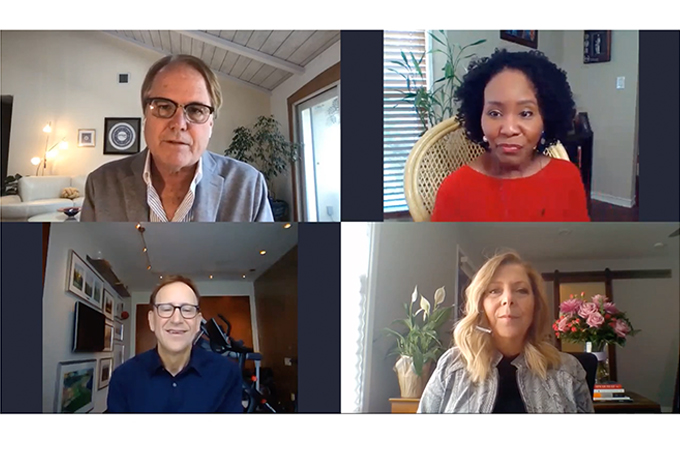How is business changing in this time of social and economic upheaval? On December 5, the University of Redlands School of Business hosted Redlands Business Day, a free virtual conference, to examine and discuss how the business community is coping with the challenges of COVID-19 and other societal factors.
More than 400 people registered to hear U of R faculty and other experts speak about building sustainable businesses, managing the impacts of COVID-19, creating and supporting diverse, equitable, and inclusive workplace cultures, the future of remote work, and finding happiness in a changing world. With over 25 speaking and networking sessions, attendees experienced a rich mix of presentations.
“At the School of Business, we are optimists,” said Thomas Horan, who is H. Jess and Donna Senecal Endowed Dean and who moderated the first panel of the day. “We wanted to spend a day talking through what this time means for businesses and how we can be proactively engaged.”
The event’s plenary session, titled “Business in a Changing World,” featured a panel of three business leaders: Pacific Market International (PMI) Founder and Global Strategist Rob Harris, SEADE Coaching and Consulting CEO Shindale Seale, and Esri Head of Commercial Enterprises Cindy Elliott. The group spoke with Horan about what it means to do good in the world of business—from developing relationships with sustainable and humane manufacturing facilities to holding organizations accountable for their diversity, equity, and inclusion (DEI) work.
Stepping up to drive change
In his remarks, Harris explained that corporations wear two hats—one to drive revenue and one that tells customers what the firm stands for—and that he cares more about the latter.
“Companies focused only on shareholders won’t exist in the future,” he said, explaining that modern business has six interests to serve: those of employees, suppliers, customers, shareholders, the environment, and humanity.
In Harris’s opinion, corporate social responsibility and DEI initiatives are not the responsibility of a single department within an organization—they are attitudes that permeate an entire company. Acknowledging the fact that everyone makes mistakes, Harris urged listeners to hold their leaders to a high standard: “You are more powerful than you think you are,” he said. “And you can drive change.”
Feeling safe and supported
As a business executive, coach, and consultant, Seale dedicates her time to ensure that people from underrepresented communities succeed in organizations. In her remarks, she focused on how the pandemic is affecting the work environment of women, underrepresented minorities, members of the LGBTQ+ community, and those with disabilities.
Seale noted that the gains seen at the beginning of the year among people from underrepresented communities holding leadership roles have nearly been erased as a result of COVID-19. In addition to the mass exodus of women from the workforce, who are likely leaving in order to fill childcare roles in their homes, periods of racial unrest added to businesses’ challenges. Still, Seale encouraged the audience to improve their work environments.
“People want to feel safe, supported, and included,” she said. “Racial minorities continue to experience a lack of resources in the workplace. Leaders should consider building robust professional development programs.”
Maintaining success and managing failure
In her remarks, Elliott touched on how some businesses are thriving while others are failing when it comes to addressing current social, political, and cultural challenges. Speaking to the value of geographic information systems (GIS) during the pandemic, she observed that government agencies, private businesses, and the public have transformed their ability to see what is happening in the world around them via the Johns Hopkins University COVID-19 dashboard, which is powered by Esri software.
Elliott also noted how companies such as Levi’s and Nike have made the right decisions when it comes to diversity, equity, and inclusion, not only in their hiring but also in recognition of diverse customer cultures. She maintained that there is a “new norm” when it comes to customers’ expectations of organizations and some CEOs are taking responsibility by making their business decisions and processes more transparent.
“We are definitely in a changing world, which has only been spurred further by COVID-19—it’s magnifying business successes and failures,” said Elliott. “This was a really important year. We realized that the way we can change things is by rallying together.”
In the closing remarks, Horan outlined a set of School of Business programs and activities set to occur in 2021 that will continue to explore the opportunities and challenges for businesses in these changing times.
“It has never been more important for the School of Business to help equip businesses and organizations—public, private, and non-profit—to succeed,” he said, “in light of the turbulence that the events of 2020 created.”
Learn more about the School of Business and its programs online and at on eight campuses throughout California.






